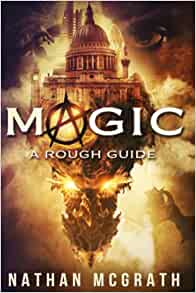‘Magic. A Rough Guide’, is my third novel. It’s a departure from ‘Nanopunk’ and its sequel ‘Lightning Seed’; about Alister Cloud, a young man infected with nanoparticles that gave him Wi-Fi powers to connect with any network or wireless-enabled electronic device – or control other electronic devices via physical contact.
The market is saturated with urban fantasy stories written for all age groups. This got me thinking about what would happen if Magic returned and how society and the government would react. The more I thought about it, the less likely it seemed that magicians would be able to hide away. People just don’t do that. We are social animals; some people like to show off, get as much out of life as possible, and have some fun. Anyone with magical powers would do the same. On the other hand, I don’t see how the government would simply let magicians go around changing reality or creating things out of thin air.
Then I started to think about magicians, where their powers come from, how these powers and abilities would affect how they see the world, and how it would affect their take on things like religion, religious books and teachings, and morals. I figured that anyone who could see through the illusions of what most people took for reality would glimpse a more profound truth. I believe such a person would naturally see the truth spoken by great spiritual teachers. So the teachings of people like Jesus, Krishna, Sri Ramana Maharishi, Buddha, the great Sufis, and Adi Dam; would all have a profound meaning and connection with them. However, I make it clear that magicians focus solely on the words spoken by these people and have no interest in the systems and institutions built around them. Magicians feel a natural closeness to the deeper truth and reality these people talked about.
The idea of Magic having its source in quantum physics, string theory, and Infinite Universe theory allowed me to steer away from any religious or supernatural bias. I started writing Magic long before any news of the first Doctor Strange film came out.
Freeing Magic from its ties to religion and ‘dark forces’ allowed me to think more broadly about the magician’s identity.
Magicians have an innate sense of a vast and endless reality beyond what ordinary people experience. This gives them a deeper perspective on what it means to be alive and the possibility of change available to everyone, not just magicians. So even though they are hunted down and can be executed for the most simple spell, they don’t kill people. They recognise the value of human life. They see how everything is connected, including people and all living things.
Magicians in my book also have innate hyperthymesia; they remember everything they see and hear. This made sense when I was assembling the magician’s identity and everything to do with a magician, their connection to this world and other dimensions, their powers, and what they needed to stay sane and connected in a universe where anything and everything could change.
Another key feature of the story is the absence of wireless communication. TV, Radio, Wi-Fi, 3G, 4G, 5G. No satellite communication. I wanted to make humanity more vulnerable by stripping away at least some layers of illusion that distract and disconnect us from raw reality. I wanted to create a world where reality was more fragile. This fragility is why brands and logos are so important in the story.
You see, Magic would be an absolute threat to the reality we’re all used to. If someone could come along and create something out of thin air or change reality, how can we be sure of anything? That’s why brands, logos, advertising and religion have become so crucial to ordinary people. They rely even more on these things to help them focus and keep their version of reality cemented together in a time when the connections between their beliefs and meaningless material stuff is threatened.
